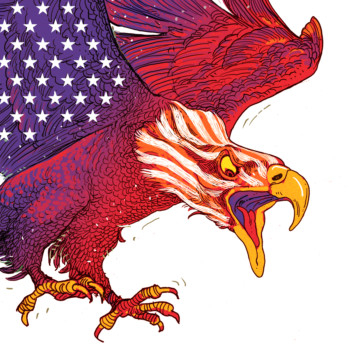
There’s a facile contention that United States President Donald Trump — hostile to free trade pacts and sceptical of grand military alliances — is an isolationist, an advocate of American retreat and retrenchment on the global stage. This is not quite true: As Cambridge historian Stephen Wertheim noted earlier this month: “Trump isn’t an isolationist. He is a militarist, something far worse.”
Throughout the election campaign, Trump proclaimed that he would be the military’s president. He repeatedly summoned the ghosts of General Douglas MacArthur and George Patton and spoke in their name. Dumping even more money into defence spending was a key plank of his platform to Make America Great Again, and Trump followed through this week by announcing plans to expand the Pentagon’s already enormous budget by $54 billion (Dh198.61 billion) — at the apparent expense of other federal agencies, including the US State Department. “Hopefully we’ll never have to use it, but nobody is going to mess with us. Nobody,” Trump said last week. “It will be one of the greatest military buildups in American history.”
“Our military will be given the resources its brave warriors so richly deserve,” Trump declared during an address to a joint session of Congress on Tuesday night, where he promised a “renewal of the American spirit”. There’s growing bipartisan disquiet with Trump’s initiatives, particularly proposed cuts to US foreign aid programmes.
Trump’s own Defence Secretary, Marine General Jim Mattis, has also previously linked diplomatic support to military success. A group of more than 120 former generals and admirals echoed Mattis in an open letter on Monday opposing Trump’s budget plans.
Meanwhile, Trump’s critics on the Left argued the expansion was simply unnecessary. Trump’s “premise is that the nation’s defences are ‘depleted,’ and he’s simply wrong”, wrote Slate’s Fred Kaplan, noting that the administration of former president Barack Obama’s last defence budget was the largest US military budget of the post-9/11 era. “If there were deficiencies in Obama’s war policies, they did not stem from a shortage of weapons or manpower.”
But the Trump administration’s embrace of the military is as much — if not more — about creating an ethos than making new policy. Trump frequently hails “his” generals (when he’s not blaming them for the deaths of service members, that is). He fixates on the projection of muscular, unilateral American power on the world stage and has sneered at the supposedly equivocating diplomacy of his predecessor.
This is all an extension of the ultra-nationalist politics of his key advisers, ideologues who see the world in stark, simple and terrifying terms. Consider the lengthy essay published earlier this month by Michael Anton, a staffer on Trump’s National Security Council whose earlier writings won him a cult following on the fringe far-right. Anton makes an argument for bolstering American “prestige” on the world stage, something he suggests was diminished under Obama.
“People like to be a part of something greater than themselves,” observed Anton, with not particularly great profundity. “This emphatically includes their nation. Patriotism is thus a natural phenomenon. It is satisfied best when people feel that their nation is strong, or at least not weak.” This is language and thinking that Trump viscerally understands.
Anton’s essay calls for a revision of American foreign policy and its focus on the “liberal world order” fashioned by Washington after the Second World War. He mocks the “cosmopolitan orientation” of liberals who preach solidarity with “strangers on the opposite of side of the world”. (Not surprisingly, Anton wrote an essay last year in which he called diversity “a source of weakness”.) He casts doubt on long-held American convictions about universal values and democracy. He instead preaches the importance of bolstering “national, civilisational” prestige — the same vague triumphalism that has peppered Trump’s speeches since last year.
What exactly this means for policy is unclear, but Trump’s America is already casting a belligerent shadow across the world. “Rather than seeking to withdraw from the world, [Trump] vows to exploit it,” wrote Wertheim, the Cambridge historian. “Far from limiting the area of war, he threatens ruthless violence against globe-spanning adversaries and glorifies martial victory.”
That militarism was part and parcel of the geopolitics of a century ago, when nationalist great powers, unchecked by the systems built after the Second World War, embarked on arms races and entered into devastating, cataclysmic conflict. Observers now see a return to the politics of that era, when a period of “liberal” free trade and proto-globalisation gave way to destabilising struggle and the collapse of empires.
“Trump’s sense of abuse and humiliation is potent,” wrote Wertheim. “‘The world is laughing at us’,” he endlessly repeats. It’s a cry more common to revolutionary states and movements than to the world’s sole superpower. Imperial Japan and Nazi Germany did not conquer territory for the thrill of it; their leaders acted out of perceived desperation, believing that they were losing a ruthless competition for power and status.”
At a time when Trump’s closest advisers obsess about status and see themselves at the vanguard of revolutionary change, the historical echoes can be chilling.
— Washington Post
Ishaan Tharoor writes about foreign affairs for Washington Post.










